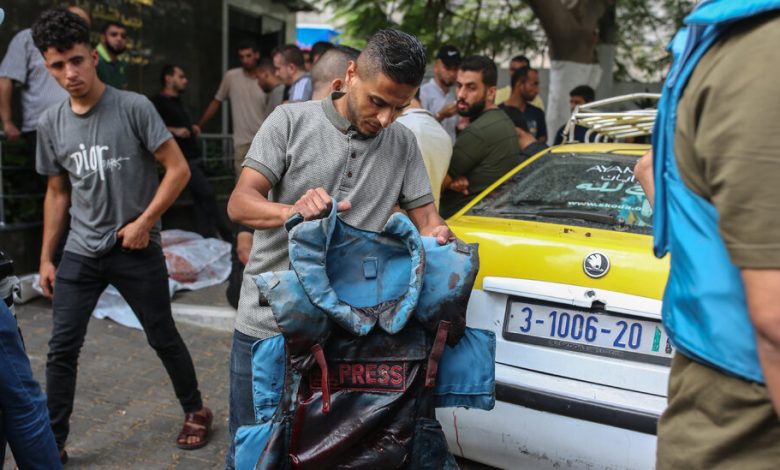At Least 11 Journalists Killed in War

Mass evacuations, airstrikes, ground fighting and extensive power outages have made reporting on the war in Gaza and Israel enormously dangerous. At least 11 journalists — nine Palestinian, one Lebanese and one Israeli — have been confirmed dead this week, according to the Committee to Protect Journalists. At least one Israeli journalist has been reported missing, and many others have been injured.
The committee is investigating additional reports of the journalists killed, wounded and missing in or near Gaza. On Friday, a Reuters videographer was killed and at least six other journalists were injured amid shelling in Lebanon, according to the committee.
Sherif Mansour, coordinator for the Middle East at the Committee to Protect Journalists, said journalists in Gaza were trying to get information out while also scrambling to evacuate and protect their families. Many have lost their houses and offices, and some are working in a hospital because it’s the only place where they can get electricity and internet.
“They are the most vulnerable, but they are also the most needed right now,” Mr. Mansour said. “They are our eyes on what’s happening.”
With his phone battery running low on Friday morning, Mohammed Mhawish, a freelance reporter, sent a WhatsApp message from Gaza City: “It is very tragic and intense here,” Mr. Mhawish, 24, wrote. “If I go absent for a long time, it’s because my phone and internet banks are running out soon.”
On Thursday, Mr. Mhawish reported for Al Jazeera on the lifesaving machines at overrun hospitals that were running out of spare fuel, after Gaza’s sole power station shut down because of Israel’s siege. The next day, Mr. Mhawish and his family were trying to find safety, he said, but they had “not been able to commute to where we should be.”
“Do not know what will happen then or how we can stay reporting,” he said, later adding: “I really can’t text now just scared.”
What was a challenging reporting environment in Gaza early this week became nearly impossible by Friday as the Israeli military ordered the evacuation of more than a million people from the north of the densely crowded strip. Saeed al-Taweel, editor in chief of Al-Khamsa News, was killed in Israeli air attacks early in the week, and mourners carrying his body placed on it one of the blue helmets worn by press.
“You never want to become the story,” Adnan Elbursh, a reporter for BBC Arabic, said in a broadcast as he walked through a hospital in Gaza. “In my city, I feel helpless, as the dead were given no dignity and the injured are left in pain.”
In Israel, too, reporters are covering the horrors engulfing their own families. They have written about attempts to save their own children, efforts to free friends taken hostage and hours spent huddled with toddlers inside the safe rooms of their homes. Civilians have found themselves transformed into war correspondents, as they dig for information while also trying to protect loved ones around the region gripped by fear and loss.
Roee Idan, an Israeli Ynet photographer, was reported missing and his family fears that he and his daughter were taken hostage, according to The Times of Israel.
Yuval Segev, a radio correspondent, spent Saturday corresponding on WhatsApp with his aunt, uncle and their children who live in Be’eri, an Israeli kibbutznear the Gaza border, where more than 100 civilians were killed.
Mr. Segev said his family members were sitting in their safe room when their house was set on fire. They escaped through the window, and then his aunt, uncle and their two oldest sons were shot by Hamas fighters as they threw themselves on their 8- and 12-year-old children, Nir and Tomer, protecting them. Nearly every day this week, Mr. Segev said, he has visited his orphaned cousins, and listened to Tomer share his nightmares.
“He describes how he sees it in his head all the time — the sounds, the blood all around his dad and his mom,” Mr. Segev, 24, said.
Reporters share the sense that their work is urgent and necessary, whether they are investigating the Israeli government’s intelligence failures, writing profiles of people taken hostage or telling the stories of those who have been killed.
Some organizations are working to amplify the accounts and analyses of people in the region, including Mideast Mirror, which provides a digest of translations in the Arab and Hebrew media, and Respond Crisis Translation, which provides interpretation services for refugees.
Reporters across the region said they were worried about gaps in information, especially as false videos — including video game footage and videos from past conflicts — circulate on social media.
“Strictly from the perspective of being able to cover this war, it will be disastrous,” Mairav Zonszein, an analyst in Tel Aviv for the International Crisis Group, said on Friday. “It will reinforce the fears, panic and dehumanization on both sides.”
Then, in mid-interview, she said: “There’s a siren. I have to cut this off.”



